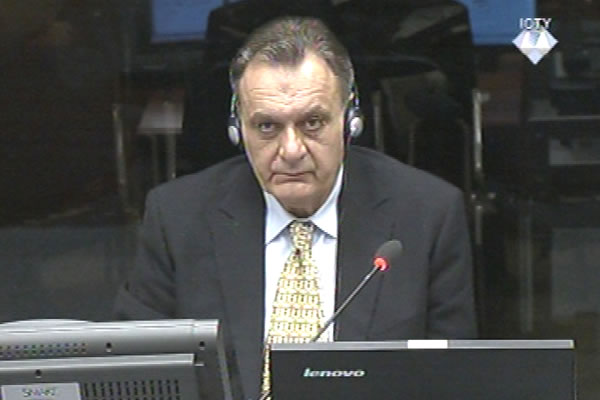Home
CIVILIANS WARNED TO KEEP AWAY AS VLASENICA MOSQUE WAS BLOWN UP
As war-time chief of the Vlasenica police Mane Djuric recounted in his evidence, he learned a couple of hours in advance that the army was about to destroy the town mosque. In Djuric’s words, he did nothing to prevent the crime but he warned the local residents to leave the area where the explosion was to occur. ‘If the army had announced it would execute three civilians in the town market, would you have contented yourself with telling the people to keep away in order not to be hit by stray bullets’, the presiding judge asked
 Mane Djuric, defence witness at Rako Mladic trial
Mane Djuric, defence witness at Rako Mladic trial Former chief of the Vlasenica police Mane Djuric spoke in his statement to Ratko Mladic’s defense about the crimes in Vlasenica. Djuric said that members of the Serb paramilitary units were responsible for the abuse of Muslims. Muslims didn’t flee Vlasenica because of the pressure exerted by the Serb authorities, Djuric claimed. According to the witness, the Muslims left because they feared for their safety just like everybody else during the war.
In the first part of today’s cross-examination, prosecutor Traldi reminded the witness that the Vlasenica mosque was blown up in August 1992. Djuric didn’t deny it; in fact, he confirmed that the army destroyed it. Some hours before the mosque was destroyed, the army informed the police about it. The police then 'exercised their powers' and alarmed the people living in the neighborhood to evacuate to avoid civilian casualties.
This prompted presiding judge Orie to join the discussion. He asked the witness if it had ever occurred to him, as the police chief, to protest against the crime - the destruction of a religious building - that had been announced in this manner. Djuric replied that he had just enough time to notify the local population to leave the area around the mosque. ‘But surely a better way to protect the people would have been to prevent the destruction of the mosque’, the presiding judge said. ‘It was impossible to prevent it then’, the witness replied, because the police didn’t have access to the mosque. The presiding judge pressed the issue, asking the witness how the police could have access to the perimeter but not to the mosque itself. Djuric then replied that in fact he had wanted to avoid the ‘conflict of authorities’. In other words, the police didn’t want to interfere in the military affairs.
‘If the army had announced that three civilians would be executed in the town, would you have contented yourself with telling the people to keep away in order to avoid stray bullets’, the presiding judge asked in his last attempt to get the witness to see his point. The witness avoided giving a straight answer noting that the ‘question was too hypothetical’. Djuric admitted that the crime had not been investigated properly at all. The police report referred to unidentified perpetrators.
Another incident that was not investigated was the mass murder in May 1992 in the village of Zaklopaca near Milici. About 60 or 80 Muslim civilians were executed. The killing of 25 civilians near Nova Kasabawasn’t investigated either. The same goes for the incident in the village Drum near Vlasenica, where 20 Muslims were executed. Djuric knew about the incidents but he blamed them on the paramilitary formations. The witness allowed the possibility that the army was responsible for the killings in the village of Drum.
In his statement to the defense, Djuric said that Susica was established as a ‘reception center’ for persons who wanted ‘safe accommodation’. According to the prosecution, Susica was a prison camp. In today’s cross-examination the witness admitted that the ‘reception center’ became a prison camp for Muslim civilians and prisoners of war in line with a military decision issued in May 1992. Initially, the Territorial Defense ran the camp, and later the army came to be in charge, the witness claimed.
In his statement to the defense team, in his testimony and particularly in his previous interviews with the investigators as a suspect, the witness shifted the blame from the police onto the army. The witness in fact alleged that police officers and members of the paramilitary groups who committed war crimes in the first few months of the war had beenattached to the army in line with an agreement between the MUP leadership and the VRS Main Staff from July 1992.
As today’s hearing drew to a close, Nedjo Vlaski began his evidence in Ratko Mladic’s defense. Before the war, Vlaski worked in the BH State Security Service.
Linked Reports
- Case : Mladic
- 2014-10-30 WAR STORIES FROM FOCA HOSPITAL
- 2014-10-29 MLADIC’S WITNESS: ‘NO ONE STARVED TO DEATH IN WAR IN BH’
- 2014-10-28 LETING HUMANITARIAN CONVOYS THROUGH
- 2014-11-04 SERBS SECEDED FROM BH BECAUSE THEY WERE ‘HUMILIATED AND OUTVOTED’
- 2014-11-05 WITNESS KNOWS NOTHING ABOUT CRIMES OF HIS FELLOW FIGHTERS
- 2014-11-06 HOW MILITARY COURT PROSECUTED SERBS IN BIJELJINA
